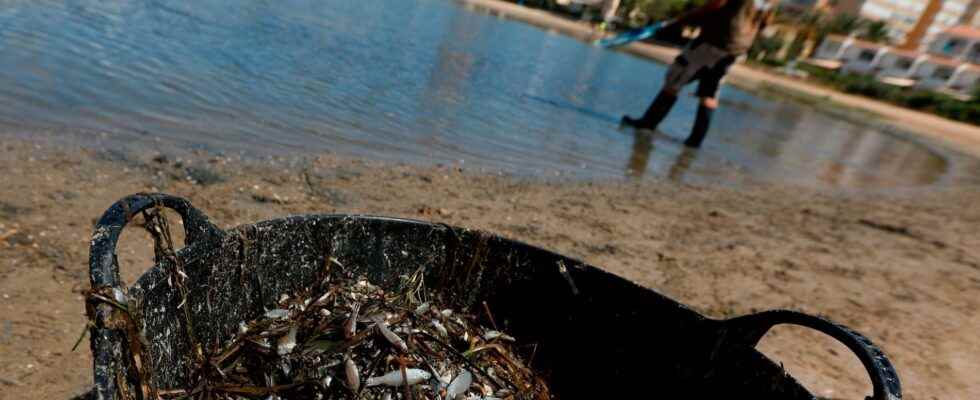Published: Just now
full screen
Next
Dead fish are collected in the Mar Menor, a popular lagoon along the Mediterranean coast of Múrcia, Spain. The fish kill occurred due to discharge in the area a year ago, when the picture was also taken.
1 of 2 Photo: Edu Botella/Europa Press/AP/TT
In the eastern Mediterranean, the water is now steadily at least 31 degrees warm in summer. Many bathing tourists may enjoy themselves, but animals and plants below the surface are tormented by “marine heat waves” which are a creeping environmental disaster, scientists warn.
While the heat on land triggers big headlines, the heat in the sea attracts less attention. Recently, experts have reported temperatures of between 3 and 5 degrees Celsius above normal in several places in the Mediterranean.
– We are pushing the system too hard, says Joaquim Garrabou, researcher at the ICM (Institut de Ciències del Mar) in Barcelona, to the AP news agency.
– We must do something about the climate issue as quickly as possible.
Down to 45 meters
Together with colleagues, Garrabou has studied marine heat waves in the Mediterranean from 2015 to 2019. There were five years in a row of such warm water that it led to MME – an English abbreviation for Mass Mortality Events, i.e. mass death in the water.
“These MMEs affected thousands of kilometers of coast, from the surface of the sea down to a depth of 45 meters,” they write in a report published in the journal Global Change Biology.
Among the study’s authors is Gil Rilov, marine biologist at IOLR (Israel Oceanographic & Limnological Research Institute) in Haifa. His Israeli port city is located along the coast in the east, from Turkey in the north to Egypt in the south, where the situation is judged to be the worst.
– It is the hottest of the Mediterranean’s hot areas, absolutely, he tells AP.
Acting sinks
Rilov assesses that even many species that have survived so far are under severe pressure.
– This is because the temperatures in which they are comfortable are exceeded every single summer.
If it hadn’t been for the oceans, the situation would have been much, much worse already. They act as carbon dioxide sinks, and absorb both heat and emissions. At least a third of all the carbon dioxide that humans have injected into the atmosphere via fossil fuels has been absorbed by the oceans.
Sick condition
But as with the extreme weather on land, the scale seems to have peaked underwater. What Gil Rilov sees happening now in the form of tens of eliminated species of corals and other life in the easternmost Mediterranean foreshadows what will happen in the future to the west, around countries like Italy and Spain, where the situation is not yet as bad.
From his base in Barcelona, Joaquim Garrabou trembles before this. He emphasizes that the ocean’s role as a sink is based on, among other things, plankton doing well.
– But now we have pushed the oceans into a sick, dysfunctional state.
What can be done to remedy this is partly the same below as above the water surface, to stop burning fossil fuels and reduce humanity’s climate impact.
Do not understand
But Garrabou and Rilov are also calling for more specific protection for marine areas, to help pressured species recover. Currently, 8 percent of the Mediterranean Sea enjoys nature protection status, but the researchers believe that at least a third needs to be protected from, for example, fishing.
Rilov doesn’t think politicians and other decision-makers understand how bad things are under the water’s surface.
– It is our job as scientists to catch their attention, he tells AP.
Facts
Mediterranean Sea
Not considered one of the world’s great oceans, but is a subsidiary ocean to the Atlantic. Since the Suez Canal was constructed in the 1860s, the Mediterranean also has a water connection with the Red Sea and thus the Indian Ocean.
With an area of over 2.6 million square kilometers, the Mediterranean Sea is almost 6 times the size of Sweden.
And it is deep – in some places it is over 5,000 meters down to the bottom, and the average depth is 1,500 meters. By comparison, you would need over 200 specimens of the relatively shallow Baltic Sea to collect the 4.25 million cubic kilometers of water that the Mediterranean Sea contains.
The water in the Mediterranean Sea is also unusually rich in species. Between 4 and 18 percent of the world’s known animal and plant species are found in the Mediterranean.
Source: AP
Read more
